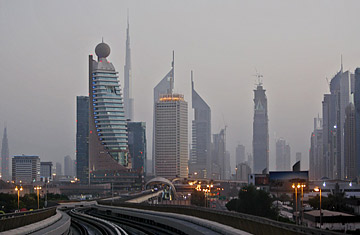
Dubai's financial crisis may have calmed a bit now that the central bank of the United Arab Emirates has promised to stand behind the city-state's banks with fresh liquidity. After all, the U.A.E., to which Dubai belongs, has perhaps $700 billion accumulated from petroleum riches — a resource that Dubai, which is apparently stuck with tens of billions of dollars in debt, does not enjoy.
But the question remains, if the central bank in Abu Dhabi decides it no longer wants to help out its construction-crazed, oil-bereft dependent, what assets would Dubai be able to offer up to the foreign banks who are owed billions?
Dubai and Dubai World, one of the flagship state-owned conglomerates, have lots of good assets, including a state-of-the-art multiterminal international airport, an airline and port facilities with vast container capacity. However, under Dubai law and the regulations of the U.A.E., banks cannot seize control and ownership of the buildings they have financed. And there are more buildings on the way. There are scads of unfinished buildings in Dubai, including high-priced residential properties. About 100,000 new dwellings were scheduled to hit the market in 2010.
So much of Dubai has been built on short-term loans, based on the idea that income from the projects would buoy liquidity and help roll forward debt payments. For example, Dubai's driverless metro system, one of the most advanced in the world, is financed through three-year notes, which the city-state believed they could renew as ticket fees helped pay the interest. Now, the international consortium that is building the system — including the Japanese construction giants Mitsubishi and Obayashi as well as the Turkish company Yapi Merkezi — are probably left with huge fees unpaid.
Creditors, therefore, had to go to the negotiating table to be able to wring out payment. Dubai's on-balance-sheet debt seems to be about $80 billion (and some observers believer there could be a substantial amount of off-balance-sheet debt as well). About 40% of the official debt is held by British banks, 30% by E.U. firms, about 9% by U.S. institutions and 7% by Japanese ones. According to a source close to Dubai World, the city-state's representatives now wants to write off some $30 billion of its debt.
The banks, not surprisingly given their current condition, have resisted, and are now in negotiations in with Dubai World. The banks may have limited options. It does little good to go after Dubai's overseas holdings because those have largely been into the troubled real estate market as well. Those holdings and joint ventures involve the Essex House hotel in New York City, the W Hotel group, MGM Mirage in Las Vegas as well as smaller interests in such properties as Raimon island in Thailand.
